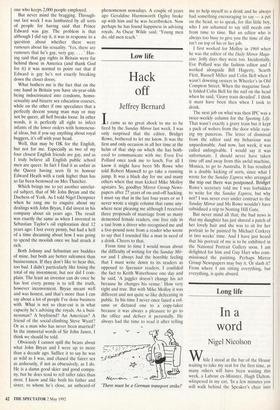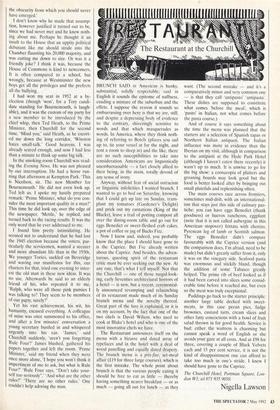Long life
In a word
Nigel Nicolson
hile I stood at the bar of the House waiting to take my seat for the first time, as many others will have been waiting this week, a Labour ex-Minister, Hugh Dalton, whispered in my ear, 'In a few minutes you will walk behind the Speaker's chair into the obscurity from which you should never have emerged.'
I don't know why he made that assump- tion, however justified it turned out to be, since we had never met and he knew noth- ing about me. Perhaps he thought it an insult to the House that an uppity political dehutant like me should stride into the Chamber flaunting his 20,000 majority, and was cutting me down to size. Or was it a friendly joke? I think it was, because the House of Commons is kind to newcomers. It is often compared to a school, but wrongly, because at Westminster the new boys get all the privileges and the prefects all the bullying.
I had won my seat in 1952 at a by- election (though 'won', for a Tory candi- date standing for Bournemouth, is laugh- able), and it was the custom of my party for a new member to be introduced by the chief whip, then Ted Heath, to the Prime Minister, then Churchill for the second time. 'Mind you,' said Heath, as he escort- ed me down the long corridor, 'Winston hates small-talk.' Good heavens. I was already scared enough, and now I had less than a minute to think up some big talk.
In the smoking-room Churchill was read- ing the Evening News. He was not pleased by our interruption. He had a horse run- ning that afternoon at Kempton Park. 'This is Nicolson, sir. The new Member for Bournemouth.' He did not even look up. Ted left us. I spoke my hastily prepared remark: 'Prime Minister, what do you con- sider the most important quality in a man?' This time he did look up, over the edge of the newspaper. 'Mettle,' he replied, and turned back to the racing results. It was the only word that he ever addressed to me.
I found him pretty intimidating. lie seemed not to understand that he had lost the 1945 election because the voters, par- ticularly the servicemen, wanted a securer and more abundant life than in the 1930s. We younger Tories, suckled on Beveridge and waving our manifestos for this, our charters for that, tried one evening to inter- est the old man in these new ideas. It was no use. Afterwards he said to an elderly friend of his, who repeated it to mc, 'Ralph, who were all those pink pansies I was talking to? They seem to he members of our party, surely?'
Yet his vast achievement, his wit, his humanity, excused everything. A colleague of mine was once summoned to his office, and after a few minutes' conversation a young secretary bustled in and whispered urgently into his ear. 'James,' said Churchill suddenly, 'aren't you forgetting Rule Four?' James blushed, gathered his papers together and left the room. 'Prime Minister,' said my friend when they were once more alone, 'I hope you won't think it Impertinent of me to ask, but what is Rule Four?' Rule Four says, "Don't take your- self too seriously".' And what are the other rules?' There are no other rules.' One couldn't help adoring the man.



















































 Previous page
Previous page